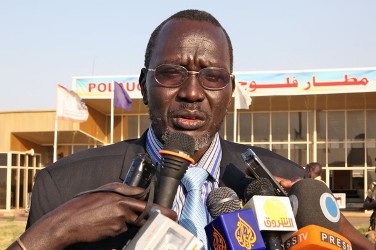Turkey and South Sudan sign economic cooperation deal
April 26, 2017 (ANKARA) – South Sudan and Turkey have inked a trade and economic cooperation agreement as a part of the latter’s commercial, political and economic relations with African nations.

“South Sudan, which is not a World Trade Organization member, will earn the status of being the country provided with the most advantages. We will also establish a joint economic commission,” said Nihat Zeybekci.
Turkey, he said, considered Africa a “significant trade partner,” and not just a provider of raw materials or a market for Turkish products.
“Today our trade volume is around $20 billion. Turkish companies have invested over $6 billion in Africa,” he said, adding that Turkish construction projects in the continent were worth about $58 billion.
“We would also like to improve our relations with South Sudan in line with our developing relations with Africa,” Zeybekci told the agency.
South Sudan’s Finance Minister Stephen Dhieu Dau was quoted saying his government seeks to further its cooperation with Turkey.
“We believe that Turkish business people will feel at home when they come to South Sudan. We invite them to invest in mining, agriculture, tourism, energy, infrastructure and oil,” said Dau, who also vowed to ensure that Turkish investments in the war-torn nation are protected.
Landlocked South Sudan is, no doubt, endowed with unlimited potential in oil, gas, forestry, livestock, fishery, tourism, mining and energy source, which provide great potential for foreign investments.
The country’s vast natural resources and the urgent need for wide ranging investment attracted foreign investors to its capital, Juba, for the first ever major investment conference held in December 2013.
South Sudan still derives 98 percent of its revenue from oil resources.
(ST)
